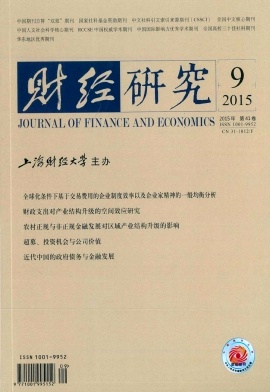财政分权与地方医疗供给水平——基于1997-2011年省级面板数据的分析
财经研究 2015 年 第 41 卷第 09 期, 页码:
摘要
参考文献
摘要
在可以“手脚并用”的约束条件之下,财政分权有利于提高公共品的供给水平是一般性的结论。而在我国,“经济的增长与竞争”成为地方政府的约束条件之后,财政支出关注的对象倾向于经济而非民生类公共品似乎是合理的。本文利用省级面板数据分析财政分权对医疗供给水平的影响。结果发现:剔除了“市场”方的供给因素,财政分权与医疗供给负相关;地方的财政能力对医疗供给有正的影响,而经济增长速度往往与之负相关;医疗供给结构偏重于医疗设施的“硬件”增加而非医务人员的“软件”增加是一个普遍现象。
[1]丁菊红,邓可斌.财政分权、软公共品供给与户籍管制[J].中国人口科学,2011,(4):44-52.
[2]付文林,沈坤荣.中国公共支出的规模与结构及其增长效应[J].经济科学,2006,(1):20-29.
[3]傅勇,张晏.中国式分权与财政支出结构的偏向:为增长而竞争的代价[J].管理世界,2007,(3):4-12.
[4]龚锋,卢洪友.公共支出结构、偏好匹配与财政分权[J].管理世界,2009,(1):10-21.
[5]林江,孙辉,黄亮雄.财政分权、晋升激励和地方政府义务教育供给[J].财贸经济,2011,(1):34-40.
[6]乔宝云,范剑勇,冯兴元.中国的财政分权与小学义务教育[J].中国社会科学,2005,(6):37-46.
[7]王永钦,张晏,章元,等.中国的大国发展道路——论分权式改革的得失[J].经济研究,2007,(1):4-16.
[8]张军,高远,傅勇,等.中国为什么拥有了良好的基础设施?[J].经济研究,2007,(3):4-19.
[9]张丽华,汪冲.解决农村义务教育投入保障中的制度缺陷——对中央转移支付作用及事权体制调整的思考[J].经济研究,2008,(10):144-153.
[10]周黎安.晋升博弈中政府官员的激励与合作——兼论中国地方保护主义和重复建设问题长期存在的原因[J].经济研究,2004,(6):33-40.
[11]Akai N,Hosoi M,Nishimura Y. Fiscal decentralization and economic volatility: evidence from statelevel crosssection data of the USA[J].The Japanese Economic Review, 2009,60(2):223-235.
[12]Alexeev M,Habodaszova L. Fiscal decentralization, corruption, and the shadow economy[J].Public Finance and Management,2012,12(1):74-99.
[13]Bardhan P. Decentralization of governance and development [J].Journal of Economic Perspectives, 2002, 16(4): 185-205.
[14]Barker D. Maternal nutrition, fetal nutrition and diseases in later life [J]. Nutrition, 1997,13(9):807-813.
[15]Barro R. Government spending in a simple model of endogenous growth[J].Journal of Political Economy,1990, 98(5): 103-125.
[16]Boax J, MartinezVazquez J ,Timofeev A. An assessment of fiscal decentralization in Armenia[J].Problems of Economic Transition, 2006, 49 (1):5-50.
[17]Busemeyer M R. The impact of fiscal decentralization on education and other types of spending[J]. Swiss Political Science Review,2008,14(2):51-81.
[18]Case A, Roux I, Menendez A. Medical compliance and incomehealth gradients[J]. American Economic Association Papers and Proceedings,2004,94(2):331-335.
[19]Freinkman L,Plekhanov A. Fiscal decentralization and the quality of public services in Russian regions[J].Public Finance and Management, 2010, 10 (1):117-168.
[20]Guess G M. Adjusting fiscal decentralization programs to improve service results in Bulgaria and Romania[J].Public Administration Review, 2007,67(4):731-744.
[21]Inman R, Rubinfeld D. Rethinking federalism[J].Journal of Economic Perspective, 1997, 11 (4):43-64.
[22]Jin Y,Sun R. Does fiscal decentralization improve healthcare outcomes? Empirical evidence from China[J].Public Finance and Management, 2011, 11 (3):234-261.
[23]Kara L,Kurt T. Beyond efficiency and economy:An examination of basic needs and fiscal decentralization[J]. Economic Development & Cultural Change, 2002, 50 (4):915-934.
[24]Kwon O. The effects of fiscal decentralization on public Spending: the Korean case [J]. Public Budgeting & Finance, 2003,12(1):1-20.
[25]MartinezVazquez J,Mcnab R. Crosscountry evidence on the relationship between fiscal decentralization,inflation,and growth[J].Proceedings of the Annual Conference on Taxation,2001,94:42-47.
[26]Nishimura Y. Human fallibility complementarity and fiscal decentralization[J].Journal of Public Economic Theory,2006,8(3):487-501.
[27]Oates W. Fiscal decentralization and economic development[J].National Tax Journal,1993, 46(2):237-243.
[28]Oates W. An essay on fiscal federalism[J]. Journal of Economic Literature, 1999, 37(3):1120-1149.
[29]Tiebout C. A pure theory of local expenditure[J]. Journal of Political Economy,1956,64(5): 416-424.
[30]Uchimura H,Jüttang J. Fiscal decentralisation, Chinese style:Good for health outcomes? OECD Development Centre Working Paper, No.264, 2007.
[2]付文林,沈坤荣.中国公共支出的规模与结构及其增长效应[J].经济科学,2006,(1):20-29.
[3]傅勇,张晏.中国式分权与财政支出结构的偏向:为增长而竞争的代价[J].管理世界,2007,(3):4-12.
[4]龚锋,卢洪友.公共支出结构、偏好匹配与财政分权[J].管理世界,2009,(1):10-21.
[5]林江,孙辉,黄亮雄.财政分权、晋升激励和地方政府义务教育供给[J].财贸经济,2011,(1):34-40.
[6]乔宝云,范剑勇,冯兴元.中国的财政分权与小学义务教育[J].中国社会科学,2005,(6):37-46.
[7]王永钦,张晏,章元,等.中国的大国发展道路——论分权式改革的得失[J].经济研究,2007,(1):4-16.
[8]张军,高远,傅勇,等.中国为什么拥有了良好的基础设施?[J].经济研究,2007,(3):4-19.
[9]张丽华,汪冲.解决农村义务教育投入保障中的制度缺陷——对中央转移支付作用及事权体制调整的思考[J].经济研究,2008,(10):144-153.
[10]周黎安.晋升博弈中政府官员的激励与合作——兼论中国地方保护主义和重复建设问题长期存在的原因[J].经济研究,2004,(6):33-40.
[11]Akai N,Hosoi M,Nishimura Y. Fiscal decentralization and economic volatility: evidence from statelevel crosssection data of the USA[J].The Japanese Economic Review, 2009,60(2):223-235.
[12]Alexeev M,Habodaszova L. Fiscal decentralization, corruption, and the shadow economy[J].Public Finance and Management,2012,12(1):74-99.
[13]Bardhan P. Decentralization of governance and development [J].Journal of Economic Perspectives, 2002, 16(4): 185-205.
[14]Barker D. Maternal nutrition, fetal nutrition and diseases in later life [J]. Nutrition, 1997,13(9):807-813.
[15]Barro R. Government spending in a simple model of endogenous growth[J].Journal of Political Economy,1990, 98(5): 103-125.
[16]Boax J, MartinezVazquez J ,Timofeev A. An assessment of fiscal decentralization in Armenia[J].Problems of Economic Transition, 2006, 49 (1):5-50.
[17]Busemeyer M R. The impact of fiscal decentralization on education and other types of spending[J]. Swiss Political Science Review,2008,14(2):51-81.
[18]Case A, Roux I, Menendez A. Medical compliance and incomehealth gradients[J]. American Economic Association Papers and Proceedings,2004,94(2):331-335.
[19]Freinkman L,Plekhanov A. Fiscal decentralization and the quality of public services in Russian regions[J].Public Finance and Management, 2010, 10 (1):117-168.
[20]Guess G M. Adjusting fiscal decentralization programs to improve service results in Bulgaria and Romania[J].Public Administration Review, 2007,67(4):731-744.
[21]Inman R, Rubinfeld D. Rethinking federalism[J].Journal of Economic Perspective, 1997, 11 (4):43-64.
[22]Jin Y,Sun R. Does fiscal decentralization improve healthcare outcomes? Empirical evidence from China[J].Public Finance and Management, 2011, 11 (3):234-261.
[23]Kara L,Kurt T. Beyond efficiency and economy:An examination of basic needs and fiscal decentralization[J]. Economic Development & Cultural Change, 2002, 50 (4):915-934.
[24]Kwon O. The effects of fiscal decentralization on public Spending: the Korean case [J]. Public Budgeting & Finance, 2003,12(1):1-20.
[25]MartinezVazquez J,Mcnab R. Crosscountry evidence on the relationship between fiscal decentralization,inflation,and growth[J].Proceedings of the Annual Conference on Taxation,2001,94:42-47.
[26]Nishimura Y. Human fallibility complementarity and fiscal decentralization[J].Journal of Public Economic Theory,2006,8(3):487-501.
[27]Oates W. Fiscal decentralization and economic development[J].National Tax Journal,1993, 46(2):237-243.
[28]Oates W. An essay on fiscal federalism[J]. Journal of Economic Literature, 1999, 37(3):1120-1149.
[29]Tiebout C. A pure theory of local expenditure[J]. Journal of Political Economy,1956,64(5): 416-424.
[30]Uchimura H,Jüttang J. Fiscal decentralisation, Chinese style:Good for health outcomes? OECD Development Centre Working Paper, No.264, 2007.
引用本文
余显财, 朱美聪. 财政分权与地方医疗供给水平——基于1997-2011年省级面板数据的分析[J]. 财经研究, 2015, 41(9): 0.
导出参考文献,格式为:





 8059
8059  4259
4259

